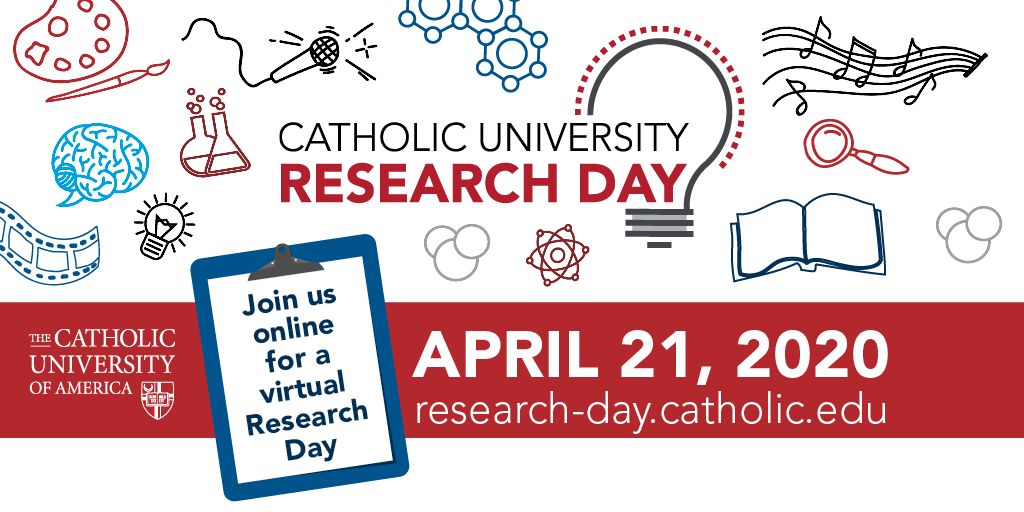

The COVID-19 pandemic will not deter Catholic University from its annual celebration of Research Day. This year, the event will happen online with more than 130 researchers explaining their work in virtual presentations.
Event co-chairs Xiaolong Luo, associate professor of engineering, and Anita Shagnea, clinical instructor of mathematics, commended students, faculty, and staff for their passion for research and their dedication to sharing their scholarly work.
“In a time when so much seems precarious and so many events are being cancelled, it's great to see the passion of this group,” Shagnea said. “Despite having their classes undergo a huge change, their classwork taking more time, being in quarantine, and the overall anxiety about the pandemic, they are willing to do something extra!”
The virtual event will be held throughout the day on Tuesday, April 21. There are no classes, including online classes, on Research Day so that the whole University community can participate. Non-law classes are cancelled through 5 p.m.; Law School classes are cancelled through 3:30 p.m.
The keynote address and program will be posted on the Research Day website with links that will provide access to the videos, posters, and other digital content created by the presenters.
Psychology Professor David Jobes will deliver the keynote address. His topic is: “The Psychology of Life: Lessons Learned from the CUA Suicide Prevention Lab.” The clinical therapeutic approach to suicide prevention that Jobes pioneered has been adopted by practitioners around the world, and has been found to quickly reduce suicidal thoughts and reduce overall symptoms of distress, depression, and hopelessness.
The decision to move forward with Research Day in spite of the obstacles posed by the COVID-19 outbreak was made by Provost Aaron Dominguez on the recommendation of the Research Day Planning Committee.
“So many students, faculty and staff were already looking forward to participating, and we didn't want to disappoint them,” said Luo. “We heard from faculty and students, especially students who are graduating, that they were excited and ready to participate. COVID-19 hasn't stopped them from working on their research, and they want to share it! Once the decision was made, it became just a problem-solving challenge.”
The goal of Research Day, according to the co-chairs, has always been to “build enthusiasm for the wide variety of research we do at Catholic University, showcasing it for the university community.”
Holding the event online creates the potential of broadening its audience beyond the CatholicU campus to include the public as well as presenters’ families, friends, and professional colleagues.
“It's an inspiring way to stay connected with our students and faculty during these isolated times,” said Shagnea, “and to be proud of the leading-edge research done at Catholic University as a global research institution.”
Luo reflected on the long-term impact of this crisis.
“The COVID-19 pandemic is surely changing the landscape of higher education in the decades to come, including how we conduct, articulate, and convey research,” he said. “The Catholic University community will be prepared to be at the front of the wave. We hope to come out of the crisis stronger and more energized than before."
As in previous years, faculty judges will evaluate every presentation, and awards will be given to the best oral and poster presentations by graduate and undergraduate students.
“Catholic University is stepping up to the challenge and doing something new and innovative, the key element of research!” the co-chairs said in a joint statement. “We are not only showcasing research projects from all over the University, but also proving that even in tough times we can pull together to do something new.”
(For accommodations, please email researchday@cua.edu.)